Can the freemium business model benefit your commercial product in the WordPress ecosystem, i.e. help you sell more premium licenses? This article looks into the 3 most popular business models in the open-source ecosystem and specifically breaks down the arguments for and against the freemium business model in WordPress. Let’s try to understand if freemium is the right business model for your WordPress product!
What Is a Freemium WordPress product?
Okay, so first thing’s first – let’s start by defining what a freemium WordPress product is:
A “freemium” WordPress product is a plugin or a theme that, in addition to their free version, offers either paid add-ons or a premium version/service (like support).
After establishing a basic definition, which I believe most would agree with, I’d like to take a look at the advantages and the disadvantages of choosing the freemium business model for your WordPress products over the other available models. But first:
What Are Your Options As A WordPress Developer?
Let’s take a quick look at the 3 most common options WordPress developers go about distributing their products:
Free WordPress Products
“Free” is (or used to be) the most immediate option for new WordPress plugins & themes in the market if you are looking to contribute something to the open-source community and get some quick active installs going. In its simple form – it basically means maintaining a WordPress product (in your spare time, because you’ll most likely need to sustain yourself off of something else) and allowing free access to it for anyone who wishes to download and install it on their WordPress website.
Granted, giving away a product for free, after having spent many hours coding and re-coding it, probably isn’t something you would consider doing on many commercial markets. However, in the WordPress ecosystem (which is part of the open-source movement, where people may expect to get things for free) this did turn into a norm.
The way many WordPress product developers think about it is:
“Many WordPress site owners may overlook my plugin if it’s not free. There are so many plugins out there, so at least if it’s free it’ll get noticed and used. Heck, people might even donate a few bucks!”
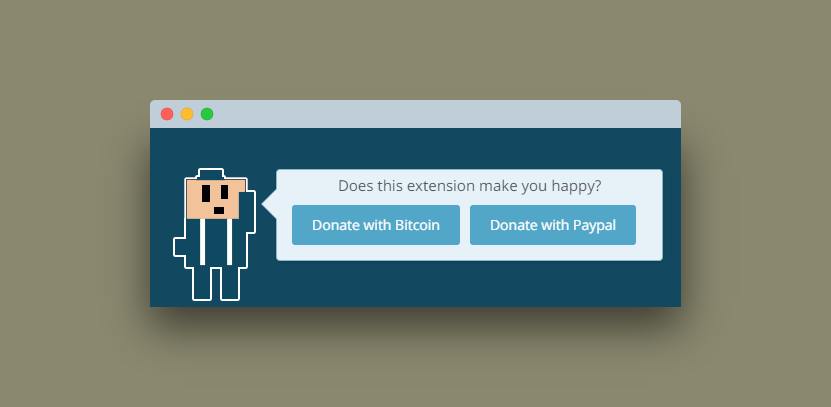
Please, don’t count on donations if you’re actually looking to build a sustainable business on top of your WordPress product, because it is NOT a sustainable model:
“I was running RatingWidget for 3 years, as a side project, for FREE. I spent over 300 hours on weekends – working 20 hours on the weekend alongside a full time job! I consider RatingWidget a highly successful project as it grossed over 200,000 downloads as a side project, but with all of that work I only received $30 in donations.
3 years, 300 hours and only $30!”Out of: “Why Free WordPress Plugins are Bad for Everyone” by Vova Feldman
If you don’t make any money off of your WordPress product – your attention to the project can never reach its full potential. Thousands of great plugins and themes on the WordPress.org repository get abandoned because developers received no financial return on their investment, and eventually had to stop working on them:
I’m sorry I’m going off on your tweet but this is what I spent ALL of #WCEU thinking about. If our ecosystem wants to be viable financially, it needs to grow up. Else, we’re continuing to choose to be a volunteer open-source community, while closed-source drives the world.
— Christie Chirinos🤷🏻♀️ (@cicichirinos) June 22, 2018
We’ve already established in past articles on this blog that an increase in the number of WordPress commercial plugins/themes is definitely in everyone’s interest because they help the entire WordPress ecosystem flourish and become more trustworthy and financially viable, by making WordPress product businesses sustainable:
“While we all love free stuff, remember that when you are supporting a commercial WordPress plugin you are doing yourself a favor and at the same time supporting independent authors, not some multi-billion dollar corporation.”
Out of: “It’s A Fact: Freemium WordPress Plugins Outlive Free Ones” by Luca Fracassi
With that in mind – if you’re just getting started with WordPress plugin development and nobody really knows who you are, then it might be a good idea to offer your first WordPress plugin for free. This will assist you in building a brand name for your business and in making more relevant users (potential customers) aware of your products and brand.
Premium WordPress Products
The PREMIUM model is indeed as simple as it sounds: create a product and then simply sell it, as is, to customers. This has been the common and simple way to do commerce and eCommerce since the dawn of time. As we all know, the mainstream way to go, if you wanted to simply sell premium WordPress products, is through established marketplaces that have the means of driving a lot of traffic and potential sales. The most well-known ones are Envato’s marketplaces, with CodeCanyon for plugins:


A different route to go with premium products is to avoid the marketplace’s brutal commission, product submission rejections, and fierce competition altogether by simply selling your WordPress products from your own website, using a service like Freemius.
Premium is definitely an easy & clear business model/strategy that enables you to generate income from all the hard work you put into your WordPress product. If you have a great product that offers functionality with little competition (themes too can go niche 😉 ), then going straight to market with a premium offering is definitely a viable option.
Freemium WordPress Products
We’ve already established a basic definition for ‘freemium’ at the top, but let’s expand a little on that: using the freemium business model enables you, the product owner, to enjoy both the distribution & marketing advantages of the free model, as well as the financial benefits of the premium world:
The freemium business model lets you enjoy both the distribution & marketing advantages of the free model, as well as the financial benefits of the premium world
The Advantages Of The Freemium Business Model in WordPress
The Gift Of Free Users
One of the greatest benefits presented by the official WordPress plugin and theme repositories is the ease in which WordPress website owners can search and install the plugins or themes they require.
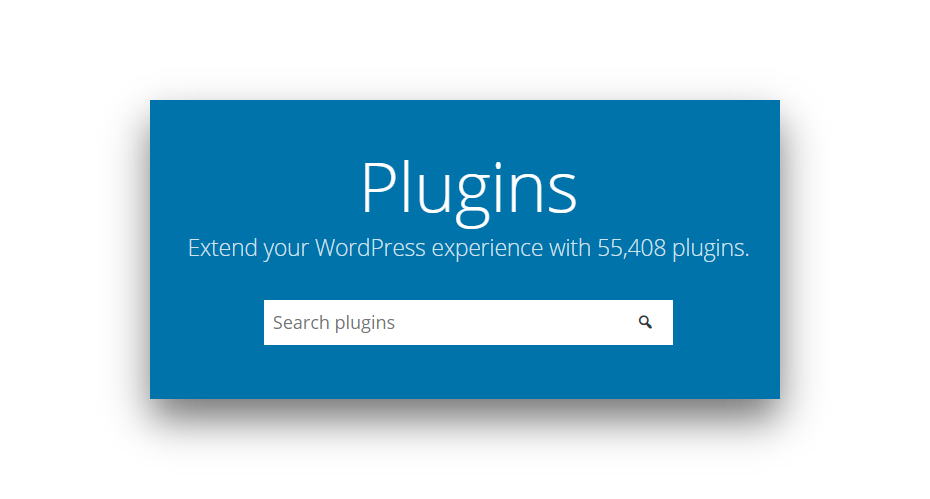
For the creators of those products, it’s a constant influx of incoming users who stumble upon their WordPress product, install it on their websites, and take it for a spin. If they think it’s any good after that – they will, most likely, keep it.
Many of you may be asking: “Ok, but what’s so great about an influx of free users? How can they help me sustain my efforts and keep the lights on if they’re not paying me a dime?”
Great question!
The short answer is: The worst thing that can happen is that one of those free users will decide to pay you some money and purchase one of your add-ons or upgrade to a paid license 🙂
The slightly longer answer is: If you think about it when you host your free WordPress product version on the official WordPress.org repository – there’s no extra cost in it for you. It is securely hosted and served to your users for free (including version updates) – so, except for the burden of having to support free users (see the disadvantages section below), no harm done, and, at the same time, you’ll be gaining more exposure and users for your WordPress product.
Upgrades, Upsells, Up Up Up!
Upgrading free users into paying users is by far the most persuasive commercial argument to be made in favor of the freemium business model. Remember the influx of free users from the paragraph above? While they may not be paying you a dime, simply due to their being “free users”, it does not mean you cannot convert them into paying users/customers somewhere down the line. As a matter of fact, you should! I’ll even throw in a few tips on how to go about doing that:
Whether you choose to sell paid add-ons/extensions that add important functionality to your free core product, or you prefer to go with a free version that upgrades into a paid, premium one, you should optimize your free user’s experience and follow some CRO (Conversion Rate Optimization) best practices that will help “push” your free users to take the leap towards paying you money & upgrade.
Consider Offering A Trial Period
Trials are only offered by a small fraction of the premium/freemium WordPress plugins and themes on the market. The main reason is that the developers are required to handle and protect their products from piracy and trial abuse, especially inside the open-source ecosystem. Once that technical obstacle is handled (either by a monetization solution like Freemius or by the actual developer), free trials can massively improve sales and conversion rate from free to paid:
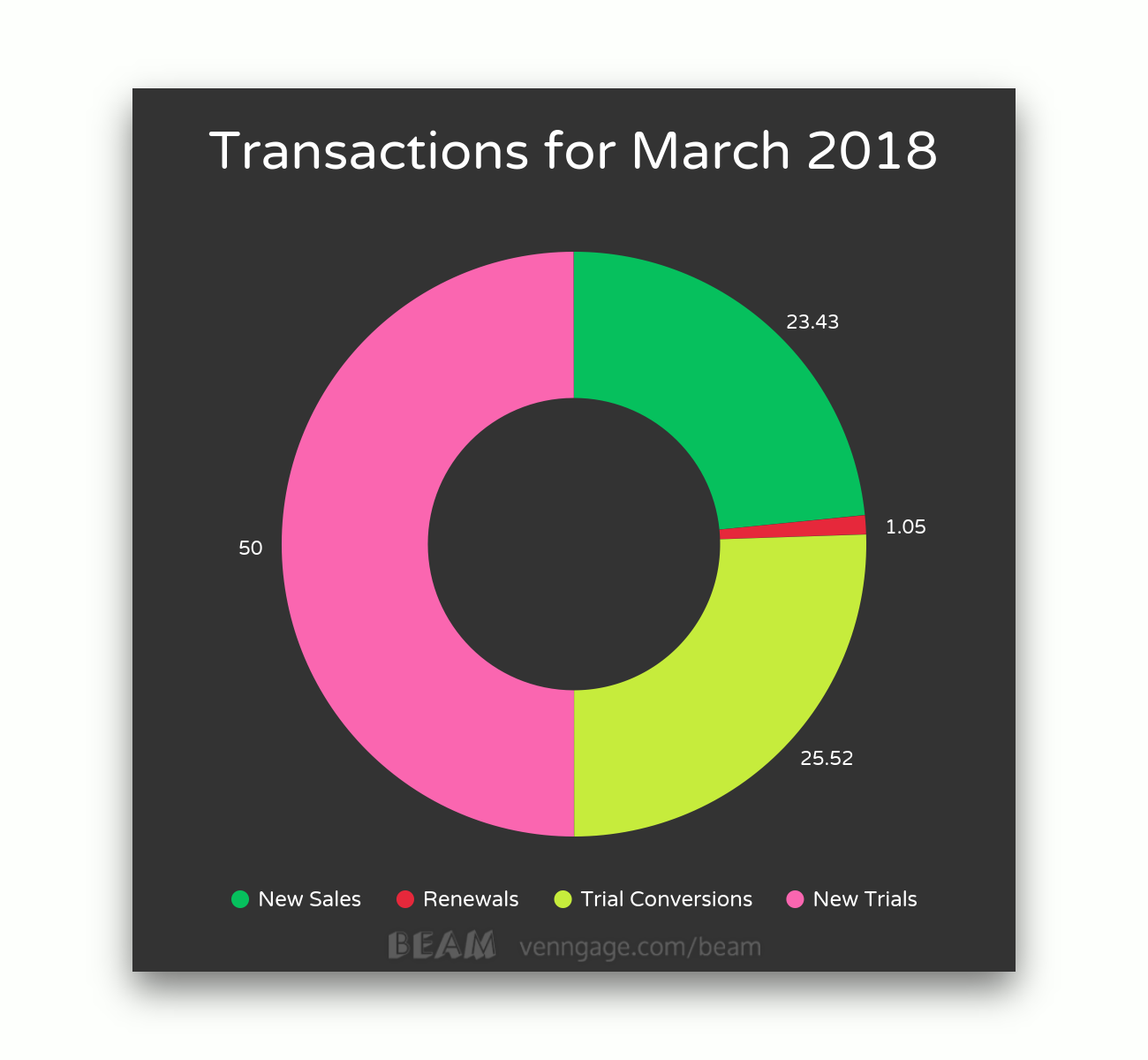
According to this pie-chart, trial conversions made up just over 25% of all transactions in March 2018 for IconicWP. That’s more than new sales (i.e. straight up purchases with no trial) at 23%.
If you’re going to provide an option for a free trial – it’s important to do so in a timely and friendly (non-intrusive and dismissable) manner. At Freemius, we show the following message on the free user’s WordPress admin dashboard only 24-hours after the activation event, so the product is still fresh in their minds, and at the same time, there’s a good chance that the user will have already tested a bunch of other alternatives:

It’s important to remember that, when offering free trials for a freemium WordPress plugin or theme – trial expiration should not block all of the features, as you might when a user does not renew a premium-only product. The expected behavior when dealing with freemium products is to fall back to the free version.
When your free user considers the option of upgrading and purchasing a license to your premium version – you could facilitate their dilemma by offering them an option to take the premium features for a spin.
Offer A Moneyback Guarantee / Refund Policy
Offer a paid version of your WordPress product, but let people know that you have a Refund Policy available, if they’re not completely satisfied with the product. Just be sure to provide clear instructions about how they may request a refund.
Make Sure The Upgrade from Free to Premium Is Seamless
As a measure of minimizing the churn rate (and support requests) that relate to the technical process of paying & upgrading from free to premium – you want to make it as easy as possible, even for dummies.
WordPress users have come to expect an easy (seamless) WordPress products installation routine inside their admin dashboard, and you’d be smart to provide them with a similar experience when they come to upgrade your product. Here’s an example of how a seamless (in-dashboard) upgrade from free → Pro is done using the Freemius monetization system:
So, right from their WordPress admin, the free users can pick a premium plan, choose their preferred payment method and make an immediate upgrade to the paid version.
Even though it is not allowed to host & serve the premium parts of your product off of the WordPress.org repo – it does not mean your premium users should be redirected back and forth, in order to download, install and activate their recently purchased premium product version. The idea is to keep it intuitive so you can take advantage of all those free users who have found your product through the official WordPress.org repository, NOT losing anyone along the way.
Broaden Your Product’s Feedback Loop
If users choose to deactivate and uninstall your product you could still use a tool like Freemius Insights to capture their opinion/reason for uninstalling and try to improve it, based on real user feedback. Additionally, if they opted-in, it provides you with their contact info so you are able to let those users know when you make any improvements and persuade them to give your product another shot.
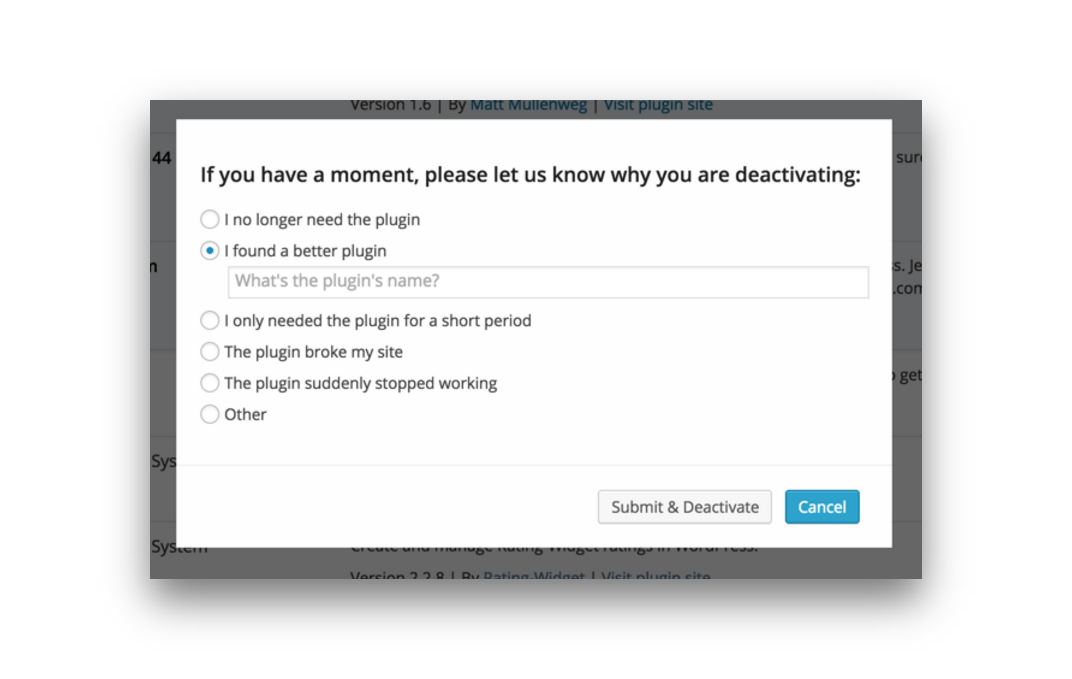
Product users are not easy to come by these days, which is why many product makers are willing to go to great lengths to get them. The WordPress.org repository actually opens up a direct path to those users, preventing the need to try so hard…
For easy access to new users – offer a free version on the WordPress.org repository.
Give Something Back To The WordPress Community
If all the mentioned benefits in offering a free version through the official WordPress.org repository aren’t enough – you can just feel good about yourself for giving something back to a well-deserved community of people.
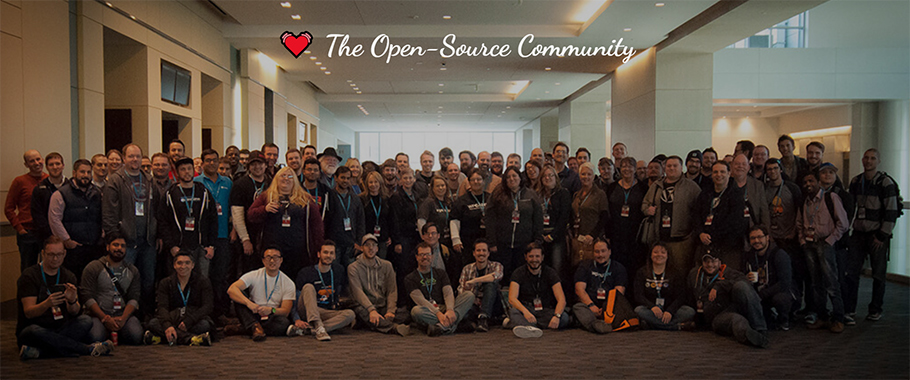
The WordPress community depends on great contributions, like your plugin or theme, to a great extent, and by increasing the inventory for WordPress users you’re essentially supporting the whole WordPress open-source ecosystem, as well as encouraging more users to come in and enjoy the abundance of offerings and options.
The Disadvantages Of The Freemium Business Model in WordPress
Your Free Version Might Be Enough
When offering a free version of your WordPress product alongside a premium version – you may discover that some users will simply not upgrade and keep using only your free version forever.
To optimize the chances of seeing an upgrade from the rest of your users, you should definitely take the time to carefully consider which pains are solely addressed by your premium version, and are kept out of the free version of your plugin. If your product’s conversion rate from free to paying is too low, it is possible you are giving too much away for free. Make your premium version upgrade-worthy, otherwise, more and more free users may choose to only stick with your free offering.
Make your premium version upgrade-worthy, otherwise, more and more free users may choose to only stick with your free offering.
Provide Technical Support For Free
The success of your free plugin version on the WordPress.org repository depends, to a large extent, on the ratings and reviews you get from your free users.
If you’re going to keep that high (preferably 4+ stars) rating and continue enjoying a stream of new users – you should probably provide support for your free ones as well, using the built-in forum that’s integrated into every plugin/theme on the repository.
The bad news is that providing support for free won’t pay you anything AND will significantly increase your support load. When you compare the number of support tickets handled by sellers who offer a freemium version vs. those who only offer a premium one – the difference can be huge.
The good news is that providing free support has its commercial benefits as well, you just need to know how to take advantage of them. I mean, if you’re going to spend all that time supporting free users – why not make it work for you and for your product? Here’s what you could do:
- Use support as a bargaining chip to increase your free → premium conversion rate: When a free user requires something that’s above what you might call “basic support” in the realm of your specific product – that would be a great opportunity to explain that and ask them to upgrade to your paid version. And they will because it will actually provide them with real value.
- If a free user asks for something that may be encompassed into a new feature, which your premium product version does not already include – don’t be shy to let them know that in order to be able to create that customized feature for them you’re going to need to allocate a significant amount of time/resources, thus justifying your request for funding for it. When it’s done & paid for you can then easily adapt that new feature into your regular main product version releases.
End result: your user’s request was fulfilled. Your premium version got a brand new feature, which you know for a fact that there’s a demand for. And lastly, you got paid extra for it. Win-win-win. - All those repeating questions from free users on the WordPress.org forum? Use them as a base for your product’s knowledge-base or FAQ. If more than 3 people ask the same question – create a detailed answer for it on your knowledge base and simply provide a link to it to the next person who asks.
- Make it a point to provide outstanding support to each of your free users and do your very best to help them out. This will most likely catch them by surprise, as outstanding support isn’t normally expected in the WordPress.org free versions world. Doing so is very likely to result in many positive, 5-star ratings for your product.
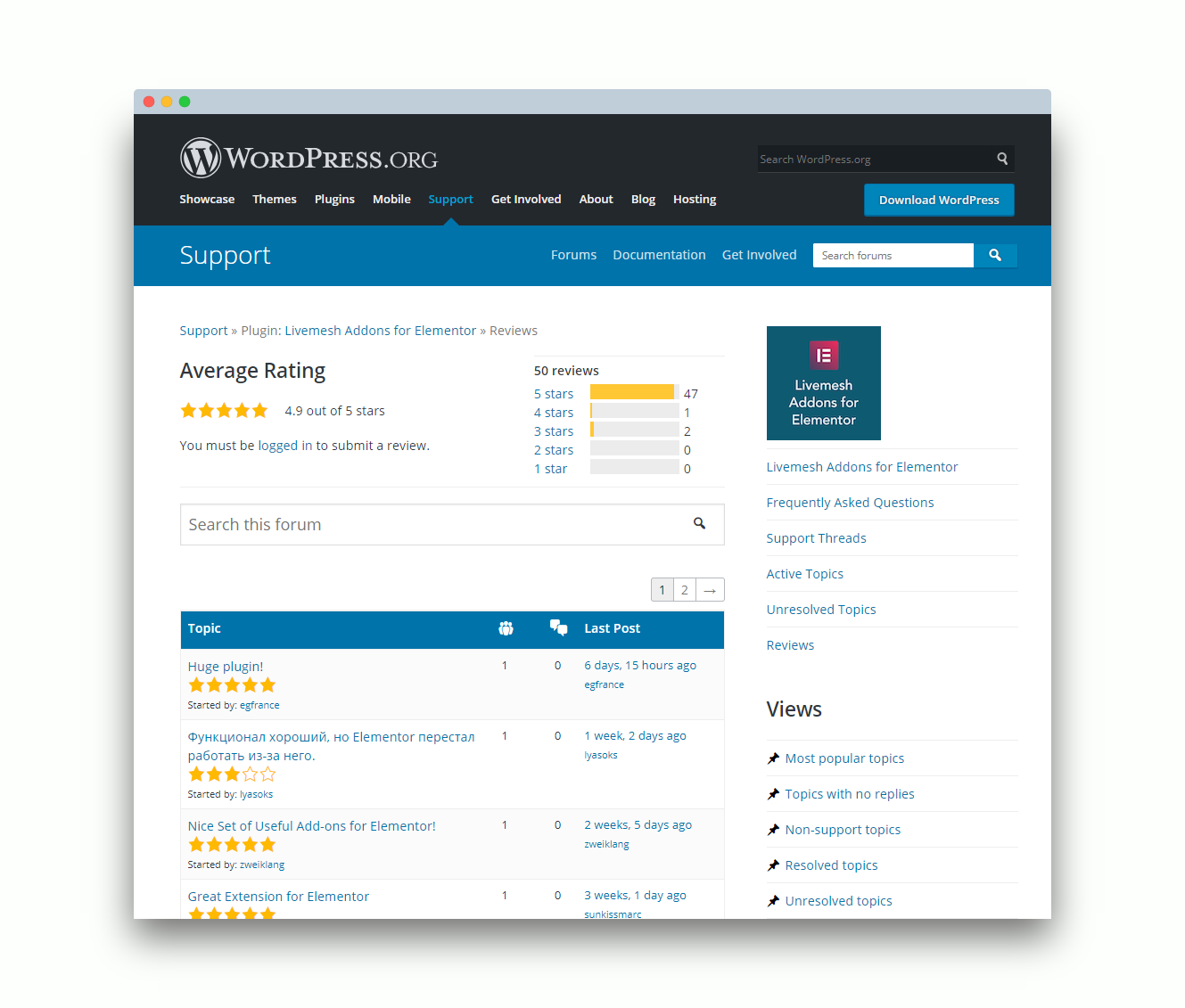
And while you’re at it, why not do just a little extra to increase the amount of positive textual reviews as well? Satisfied users will be happy to provide those – it all depends on how and when you ask 😉
Grab a free copy of our Cheat Sheet for
Selling Plugins and Themes
A growth roadmap with concise, actionable tips for every milestone of WordPress product development.

As you can see, it is definitely possible and even easy to take free support, often perceived as sour lemons by many WordPress product owners, and turn it into tasty lemonade! After you’ve gained some experience and a positive reputation you still need to remember to differentiate the support you provide for free users from the one you provide for paying users. Needless to say that paying users should get a priority and possibly even a hand-holding approach to help them resolve any issue that comes up.
Providing free technical support has its commercial benefits to it, you just need to know how to take advantage of them.
So, Is It Worth It?
As Yoast put it:
“Making money with the development and distribution of open-source software is very possible. This combination is not weird at all.”
After realizing what are the benefits of choosing the freemium business model for your WordPress product, as well as taking the drawbacks into account, you should, at the very least, consider the freemium business model as an option.
At the end of the day, you need to take a good look at the product you’ve built/planning to build and wonder whether the freemium business model is right for it. As an example, I’m not sure I’d go freemium with products that are too niche and have a low potential range of users, to begin with. The conversion rate needs to be taken into account here because if you’re already starting out with few users, you’ll obviously find that even fewer will upgrade.
Another line of the product I would not go freemium with are products that have a hard time providing additional value to those who upgrade from free to premium. If your product is a plugin with only one functionality it can seem ridiculous to charge money from people, just to continue to provide them the exact same thing.
For product types that are more well-suited though, setting up a way to take advantage of all those free users you may gain through the repo is definitely worth the effort.
Which model did you choose for your WordPress product? Did you go freemium? If yes – then how are you enabling your users to upgrade their free version to a premium one? Sound off in the comments below 🙂









I've received tons of great information from your article. Can you share more about the disadvantages of premium WordPress business model? Many thanks.
Glad you find it useful, Rosie!
You can learn about the differences between the freemium and the premium model here:
https://freemius.com/blog/premium-versus-freemium-wordpress-plugins/